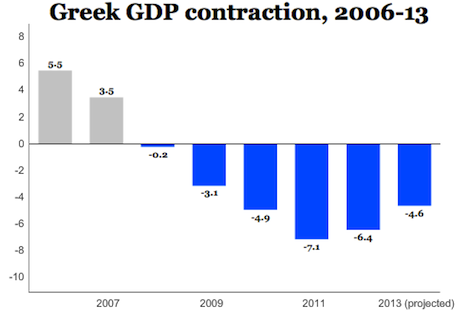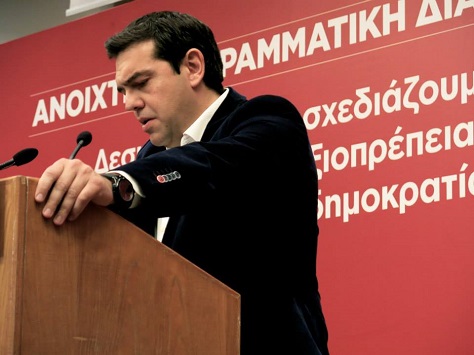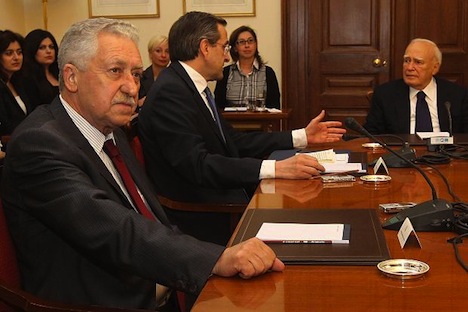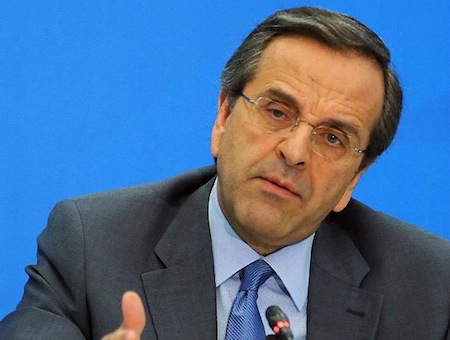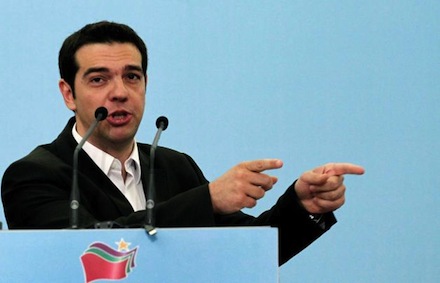With the failure of Greece’s parliament to elect a president after a third and final vote this morning, prime minister Antonis Samaras will dissolve the parliament and schedule early elections — most likely on January 25.![]()
It will be the first election since June 2012, when Samaras’s center-right New Democracy (Νέα Δημοκρατία) narrowly defeated the hard-left SYRIZA (the Coalition of the Radical Left — Συνασπισμός Ριζοσπαστικής Αριστεράς). According to just about every poll, SYRIZA holds a lead of between 3% and 7% against New Democracy.
Expect a tough Samaras-Tsipras fight for first place
Samaras is a wily and seasoned campaigner, and he will undoubtedly cast himself as the guardian of Greece’s long-term stability. On Monday morning, he was lashing out at ‘political terrorism,’ and warning that a SYRIZA victory would allow Greece’s sacrifices to go to waste. SYRIZA will face sustained criticism — some justified, some overblown — from just about every quarter in Europe that it and its leader, Alexis Tspiras, are dangerous ideologues whose policies could force Greece out of the eurozone in 2015. Already, publications like The Guardian are referring to Greece being ‘plunged into crisis.’ Expect the fear-mongering about the consequences of a SYRIZA victory to be on par with efforts by the British political establishment and business community in the fraught week leading up to the Scottish independence referendum. It’s by no means certain that SYRIZA’s narrow single-digit lead will survive that kind of onslaught.
The fight between SYRIZA and New Democracy is so important because the first-place finisher in the election will not only win the largest share of seats in the 300-member Hellenic Parliament (Βουλή των Ελλήνων), but also a 50-seat ‘bonus’ meant to provide the winning party with enough seats to form a working majority government. Over the next few days, it will be worth watching to see whether SYRIZA or New Democracy convince any other smaller parties to merge, because the marginal value of even a one-vote victory in Greek elections is so consequential.
Since 2012, Greek economic conditions are slightly improved. Greece’s GDP is set to grow by between 1.0% and 1.4% in 2014, following six consecutive years of contraction, and there’s every reason to believe it will continue to expand in 2015. The government even attempted a reasonably successful bond sale in April, and Greece’s staggering unemployment rate is now just 25.7%, down from its high of 28%.
Nevertheless, the dual cuts of budget austerity and economic depression have, understandably perhaps, left the Greek electorate weary of renewing a mandate for austerity, and the uncertainty over the country’s political future has pushed 10-year bond yields to an unsustainable 8.5%.
Greece’s ‘bailout’ questions remain unsolved
Fueling that uncertainty is Greece’s planned exit from its bailout program in February 2015, just days after the election.
Continue reading What to expect from Greece’s January 25 snap elections

